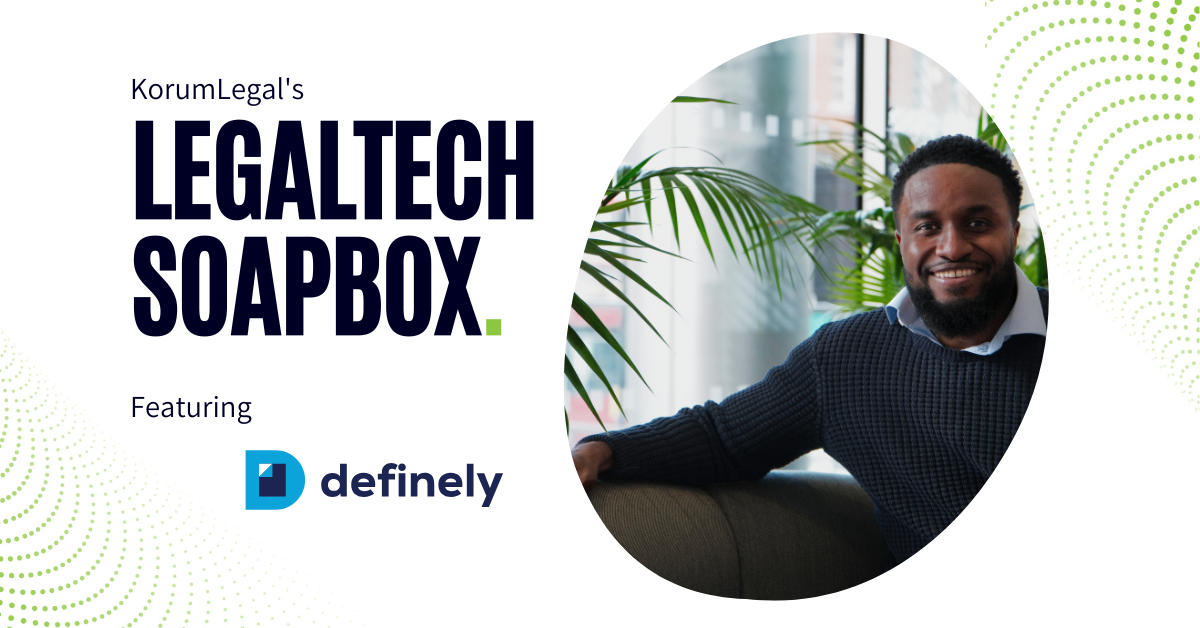LegalTech Soapbox: Enhance your daily operations with Definely.

1. Hi Nnamdi, tell us the story behind Definely
Definely began when I met my now co-founder, Feargus MacDaeid, while we were both lawyers at Freshfields, a Magic Circle firm. Feargus is one of the few registered blind lawyers in the UK, and witnessing how he struggled to navigate legal documents sparked an idea. I wondered if there might be a better way for visually impaired lawyers to manage complex contracts. What started as a solution for one blind lawyer quickly grew into a tool designed to make legal work more efficient for all lawyers.
Fast forward to today, Definely has been recognised as one of Deloitte’s top 25 Fastest-growing companies. We’re now working with some of the world’s largest organisations, including A&O Shearman, Slaughter and May, Deloitte, and P&O Cruises.
2. What are the services or products that Definely provides?
Definely offers a suite of products that streamline the pre-execution stage of contract drafting. Our solutions are integrated directly into Microsoft Word, allowing lawyers to use them within their existing workflows with a minimal learning curve.
Our flagship product, Definely Draft, enables lawyers to access and edit information such as definitions and cross-references within a document without navigating away from the clause or provision under review. Definely Vault allows users to tap into their organisation’s knowledge base by connecting to contract repositories and clause libraries, enabling them to categorise and retrieve clauses, provisions, and definitions without leaving their current document. Lastly, Definely Proof automates hundreds of proofreading checks at the click of a button, ensuring documents are consistent and error-free.
Advances in technology are allowing us to expand on these capabilities, solving more of the everyday challenges lawyers face. For example, we’re developing tools to search for clauses using natural language, provide contextually relevant results, understand relationships between parts of a document, and generate accurate summaries of clauses—all with a single click.
3. How does the above optimise the daily operations of an in-house legal team/ law firm?
Put simply, Definely enables lawyers to access essential information in the most efficient way possible. Our tools help increase productivity by reducing time spent on repetitive, time-consuming tasks. Additionally, they improve accuracy, reducing the risk of errors or oversights making their way into contracts. For example:
- Faster, more accurate contracts: Lawyers can easily access the organisation’s collective knowledge, quickly searching for and inserting existing, high-quality clauses.
“Each of our lawyers using Definely saves 45 minutes per day!” – Laura Bygrave, Head of Commercial at Deloitte Legal
- Seamless context: Users never lose focus or context while working on a clause. They simply double-click a defined term on a defined term to view its definition in the Definely panel without leaving their current section.
- Automated proofreading: Manually proofreading contracts is often inefficient and error-prone. Our proofreading tools, specifically designed to handle the unique structure and complexities of legal documents, significantly reduce the chance of error.
“Definely Proof provides a range of innovative tools, which allows me to further reduce the administrative burden in my day-to-day drafting by addressing the pain of proofreading.” – Anton Jarbøl, Senior Associate at Dentons
4. What do you believe will be the most significant change in how in-house legal teams use technology in the next 10 years?
The rapid pace of technological change we’re experiencing will redefine not only how law is practised but also how lawyers are educated and trained. I think technology will increasingly shape how lawyers interact with documents, potentially introducing multi-modal approaches - like voice and text interfaces - that make accessing and managing information even more intuitive. Additionally, as technology enables real-time collaboration, we’ll see a shift in the dynamics between law firms and clients, with greater transparency and responsiveness becoming the norm.
From a legal perspective, the emergence of generative AI and other advanced technologies will open new possibilities in the practice of law, supporting tasks like drafting, reviewing, and analysing contracts with unprecedented speed and precision. As these tools become more integrated into legal workflows, they will empower lawyers to focus on higher-value, strategic work, further elevating the profession.
Lily Evans and Nnamdi Emelifeonwu
May 19, 2025
Related Posts.
By: Lily Evans, Evan Schneyer and Dan Dalzotto
LegalTech Soapbox: Improve your daily operations with Outlaw
Outlaw’s Co-Founder and CEO, Evan Schneyer, started his first tech company a decade ago. It later sold to TripAdvisor, and the experience left him inspired and determined to build a platform that..
By: Lily Evans and Ryan Anderson
LegalTech Soapbox: Empower your daily operations with Filevine
Featured in our LegalTech Soapbox Series this month is Filevine. As a former litigator, Ryan Anderson, CEO & Co-Founder designed Filevine with the end user in mind, focusing on unlocking customer and..
